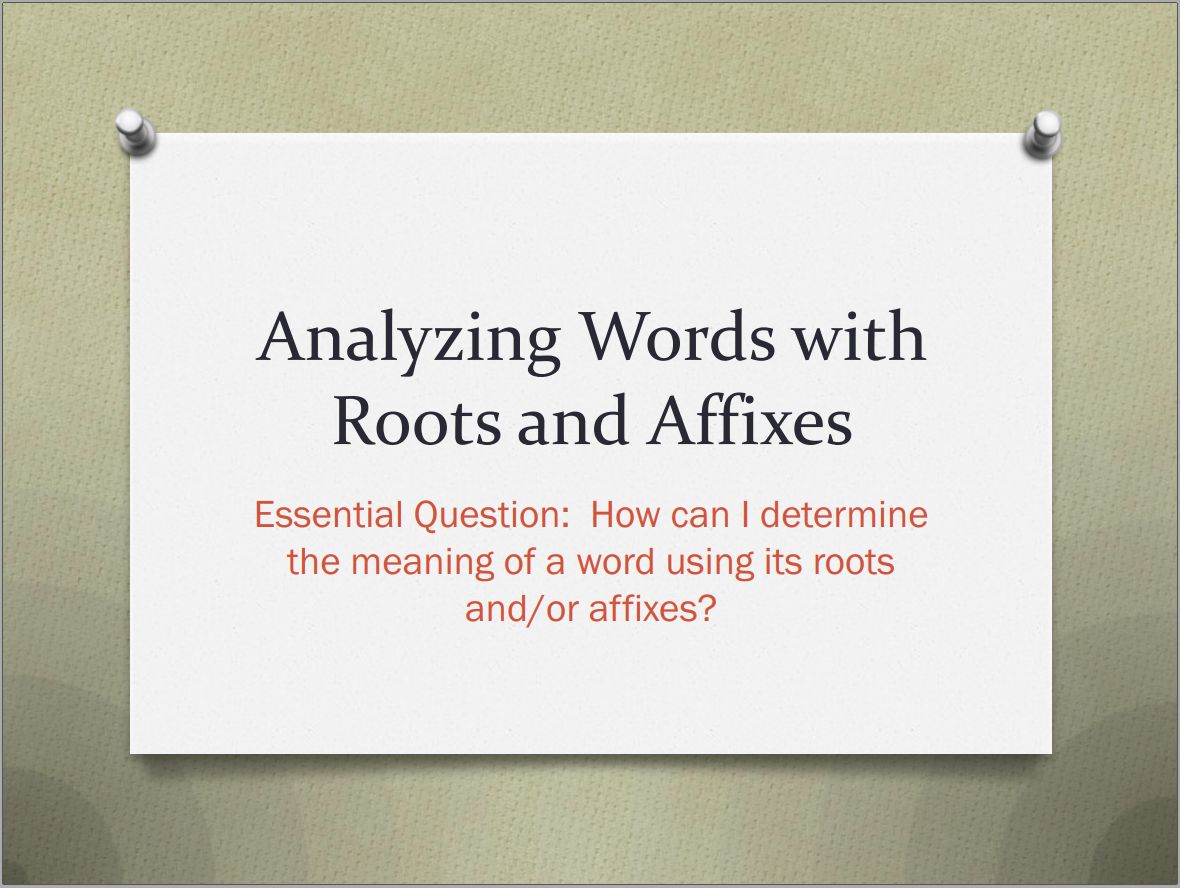Learning Greek and Latin roots and affixes is extremely beneficial for expanding vocabulary as well as improving reading and writing skills. Consider yourself on a treasure hunt, with each word representing a treasure chest. Many of these treasure chests can be unlocked by learning the Latin and Greek roots. Without the key, you’d have to open each chest individually, which would take a lot of time and effort. However, with the key, you can easily open many of the chests and find the treasure inside.
The meaning of words is this treasure, and by learning these roots, you can understand many words without having to memorize them individually. It’s as if you had a secret code that could help you understand new words and phrases simply by breaking them down into their roots. And, as with a treasure hunt, the more treasures you discover, the richer and more powerful your vocabulary becomes.
Also, understanding roots can help you with reading and writing. Many words are spelled the way they are because of their Latin and Greek origins. By understanding these roots, you can more easily spell and use words correctly. So you see, learning Latin and Greek roots can be a lot of fun and can give you the key to unlocking many treasures in the English language.
In addition to expanding vocabulary, learning Latin and Greek roots can also have other important benefits. For example:
- It can improve critical thinking skills. By breaking words down into their roots, students learn to analyze and think about language in a deeper way. This can help them to become better problem-solvers and critical thinkers.
- It can increase cultural awareness. Latin and Greek are the root languages of many modern languages and cultures. By studying these roots, students can gain a deeper understanding of the history and culture of many countries.
- Students can improve their performance on standardized tests like the SAT and ACT by studying Latin and Greek roots. This may eventually lead to improved academic performance.
- Learning Latin and Greek roots can be difficult, but it can also be very rewarding. Students can gain a sense of accomplishment and boost their confidence by putting in the effort and successfully mastering these roots.
Overall, learning Latin and Greek roots and affixes (video) can be a valuable and enjoyable experience for students. It can help them to expand their vocabulary and improve their reading and writing skills, while also developing critical thinking skills, cultural awareness, and sense of accomplishment. Also check out our page, Latin & Greek Roots, Prefix, Suffix Lessons, Lists & Teaching Helps.
247 Latin Roots in English Words
- ab- (meaning “away” or “from”): abdicate, abject, abnegate
- ad- (meaning “to” or “toward”): adduce, adulate, adverb
- ag- (meaning “do” or “act”): agitate, agglutinate, aggrandize
- agri- (meaning “field” or “country”): agriculture, agrarian, agribusiness
- ali- (meaning “other”): alias, alibi, alienate
- ambi- (meaning “both”): ambivalent, ambidextrous, ambivalent
- anim- (meaning “soul” or “mind”): animal, animate, animus
- ann- (meaning “year”): anniversary, annual, annuity
- aqu- (meaning “water”): aquatic, aqueduct, aquifer
- arbor- (meaning “tree”): arbor, arboreal, arboriculture
- au- (meaning “gold”): aureole, aurelia, aureate
- bene- (meaning “good”): benefit, benevolent, benefactor
- bi- (meaning “two”): bicentennial, biped, bilateral
- bon- (meaning “good”): bonanza, bonafide, bon vivant
- cad- (meaning “fall”): cadence, cadenza, cascade
- cap- (meaning “head”): capital, capitol, capitation
- capt- (meaning “seize”): captive, capture, captor
- carn- (meaning “flesh”): carnal, carnivorous, incarnate
- caut- (meaning “be careful”): caution, cautious, precinct
- ced- (meaning “go” or “yield”): concede, recede, secede
- cent- (meaning “hundred”): century, cent, centenarian
- cogn- (meaning “know”): cognition, cognomen, incognito
- cor- (meaning “heart”): cordial, accord, concord
- corp- (meaning “body”): corporation, corpse, corporal
- cosm- (meaning “universe”): cosmos, cosmic, cosmology
- crim- (meaning “judge” or “decide”): crime, criminal, criterion
- curi- (meaning “care” or “worry”): curious, curiosity, incur
- de- (meaning “down” or “off”): deflate, detract, degrade
- dec- (meaning “ten”): decimal, decagon, decade
- dem- (meaning “people”): democracy, demography, demagogue
- dic- (meaning “say” or “speak”): dictionary, dictate, dictator
- doc- (meaning “teach”): doctor, document, doctrine
- domin- (meaning “lord” or “master”): dominant, domain, dominate
- dorm- (meaning “sleep”): dormant, dormouse, dormitory
- dub- (meaning “doubt”): dubitable, dubiety, dubious
- duc- (meaning “lead” or “carry”): ducal, ductile, educate
- dur- (meaning “hard” or “difficult”): durable, duration, endure
- ebur- (meaning “ivory”): eburine, eburnation, eburnean
- equ- (meaning “equal”): equal, equality, equidistant
- fac- (meaning “do” or “make”): facilitate, factory, factotum
- fid- (meaning “trust”): fiduciary, infidelity, confide
- flu- (meaning “flow”): fluid, influence, superfluous
- fore- (meaning “before”): forego, foretell, forefather
- gaud- (meaning “joy”): gaudy, gaudery, ingaud
- gen- (meaning “birth” or “origin”): gene, generation, genetic
- geo- (meaning “earth”): geology, geography, geosphere
- grand- (meaning “big”): grand, grandiose, grandeur
- horr- (meaning “shudder”): horror, horrible, horrify
- hum- (meaning “earth” or “ground”): human, humble, humid
- hypno- (meaning “sleep”): hypnotize, hypnotic, hypnoid
- jac- (meaning “lie”): jacent, jaculate, deject
- jud- (meaning “judge”): judicial, adjudicate, judge
- juni- (meaning “young”): junior, juniper, rejuvenate
- labor- (meaning “work”): labor, laborer, laborious
- leg- (meaning “law” or “send”): legal, legislate, delegate
- lev- (meaning “light” or “raise”): levity, elevate, lever
- liber- (meaning “free”): liberty, liberate, liberal
- luc- (meaning “light”): lucid, translucent, transparent
- lud- (meaning “play”): ludic, ludicrous, prelude
- lumin- (meaning “light”): luminous, luminescent, luminary
- lun- (meaning “moon”): lunar, lunacy, lunate
- magn- (meaning “great”): magnate, magnify, magnitude
- mal- (meaning “bad” or “evil”): malefactor, malicious, malign
- man- (meaning “hand”): manage, manual, manufacture
- manu- (meaning “hand”): manual, manuscript, manipulate
- mar- (meaning “sea”): marine, mariner, maritime
- medi- (meaning “middle”): median, mediocre, mediocrity
- mem- (meaning “mind” or “memory”): remember, memo, memorandum
- men- (meaning “month”): menstrual, menopause, menage
- ment- (meaning “mind”): mental, mention, mentor
- mer- (meaning “sea” or “lake”): mermaid, merriment, inmerse
- meta- (meaning “after” or “beyond”): metamorphosis, metonymy, metaphysics
- micro- (meaning “small”): microbe, microscope, microcosm
- mill- (meaning “thousand”): millimeter, millenarian, millennium
- mis- (meaning “wrong” or “bad”): mistake, misuse, misanthrope
- mit- (meaning “send”): emit, remit, transmit
- mob- (meaning “move”): mobile, mobility, immobilize
- mon- (meaning “one” or “single”): monopoly, monotone, monocle
- mor- (meaning “death” or “fate”): mortal, moribund, morbid
- morph- (meaning “shape”): metamorphosis, amorphous, polymorphous
- muc- (meaning “mucus”): mucous, mucilage, emulsion
- mut- (meaning “change”): mutate, mutable, immutable
- nasc- (meaning “be born”): natal, nascent, renaissance
- neo- (meaning “new”): neonate, neon, neophyte
- neur- (meaning “nerve”): neurosis, neuron, neurosurgery
- nom- (meaning “name”): nominal, nominate, denominate
- nov- (meaning “new”): novel, novitiate, innovation
- nu- (meaning “new” or “cloud”): nuptial, nucleus, nuage
- numer- (meaning “number”): numeral, numerous, enumerate
- obl- (meaning “toward”): oblique, obligate, oblivion
- oc- (meaning “eye”): ocular, oculist, binocular
- omni- (meaning “all”): omniscient, omnipotent, omnivorous
- oper- (meaning “work”): operation, operative, co-op
- orth- (meaning “right” or “straight”): orthodontics, orthodox, orthography
- over- (meaning “too much” or “excess”): overdo, overdrive, overreach
- pac- (meaning “peace”): pacify, pacific, pacifist
- pact- (meaning “to make” or “to agree”): pact, compact, impact
- pan- (meaning “all”): panacea, pandemic, panoramic
- par- (meaning “equal” or “beside”): parity, par
- par- (meaning “equal” or “beside”): parity, parallel, divorce
- pare- (meaning “bring forth” or “produce”): parenthood, parent, paregoric
- pari- (meaning “equal”): parity, paragon, paripassu
- patr- (meaning “father”): patriarch, patron, patrimony
- pau- (meaning “few”): paucity, pause, impoverished
- ped- (meaning “foot”): pedestrian, pedagogue, pedal
- pel- (meaning “drive” or “push”): repel, propel, impel
- pend- (meaning “hang” or “weigh”): pendant, pending, depend
- pens- (meaning “pay”): compensate, recompense, expense
- per- (meaning “through” or “thoroughly”): pervade, peruse, perceive
- peri- (meaning “around” or “near”): perimeter, periscope, peripatetic
- pet- (meaning “seek” or “aim for”): petite, petition, competitive
- petr- (meaning “stone”): petroleum, petrous, petroglyph
- phal- (meaning “fruit”): phalanx, phallic, sycophant
- phob- (meaning “fear”): phobia, phobic, phobocracy
- phot- (meaning “light”): photograph, photosphere, photosynthesis
- pign- (meaning “pig”): pignut, pignus, pignorate
- plac- (meaning “plead”): placate, placid, implacable
- plen- (meaning “full”): plenitude, plentiful, plenipotentiary
- pleth- (meaning “fullness”): plethora, plethoric, plethysmograph
- plic- (meaning “fold”): ply, plication, implicate
- plur- (meaning “more”): plural, plus, pluri-
- pneum- (meaning “breath” or “air”): pneumonia, pneumatic, pneudo-
- poc- (meaning “drink”): potion, poculiform, impocible
- pod- (meaning “foot”): podiatry, podium, podocyte
- poli- (meaning “many”): police, policy, metropolis
- pom- (meaning “fruit”): pomaceous, pomology, pomander
- popul- (meaning “people”): popular, populous, populate
- post- (meaning “after” or “behind”): postdate, posterior, posthumous
- pot- (meaning “able” or “having power”): potent, potential, impotent
- pre- (meaning “before” or “in front of”): prevent, preface, precedent
- pro- (meaning “for” or “forward”): prodigy, process, pronoun
- prob- (meaning “test”): probe, problem, probation
- prod- (meaning “drive forward”): prod, produce, product
- prol- (meaning “grow” or “spawn”): prolegomena, prolific, proliferate
- pug- (meaning “fight”): pugnacious, pugilist, impugn
- puls- (meaning “drive” or “push”): pulse, pulsate, pulsar
- pur- (meaning “pure”): purge, purify, puritan
- quadr- (meaning “four”): quadrangle, quadrilateral, quadruped
- quae- (meaning “question”): quandary, quaver, query
- qual- (meaning “what kind”): qualify, quality, disqualify
- quir- (meaning “church” or “temple”): quire, quireful, quirer
- radic- (meaning “root”): radical, radicle, eradicate
- radix (meaning “root”): radical, radicle, eradicate
- rap- (meaning “seize” or “grab”): rapacious, rapt, rapine
- re- (meaning “back” or “again”): return, renew, recreate
- rec- (meaning “back” or “again”): recant, recent, receipt
- red- (meaning “back” or “again”): redo, redolent, reduction
- reg- (meaning “rule” or “govern”): regal, regent, regimen
- rel- (meaning “back” or “again”): release, relic, relieve
- rem- (meaning “back” or “again”): remove, reminder, remodel
- ren- (meaning “kidney”): renal, renascence, reniform
- rep- (meaning “again” or “back”): report, reprieve, repay
- res- (meaning “thing” or “matter”): resort, residue, resource
- retro- (meaning “back” or “behind”): retrograde, retrospect, retroactive
- rev- (meaning “back” or “again”): revert, review, revision
- rout- (meaning “break” or “destroy”): rout, routine, corrupt
- sacr- (meaning “sacrifice”): sacrifice, sacrosanct, sacristan
- sal- (meaning “salt”): salinity, salsa, salient
- sanct- (meaning “holy”): sanctify, sanctity, sanctum
- sanguin- (meaning “blood”): sanguine, sanguinary, consanguine
- sap- (meaning “taste”): sapid, sapor, insipid
- satur- (meaning “full”): saturate, saturation, insatiable
- scal- (meaning “ladder”): scale, escalator, scalene
- sci- (meaning “know”): science, conscience, omniscient
- scrib- (meaning “write”): scribble, scribe, inscription
- sect- (meaning “cut” or “follow”): sect, sectarian, insect
- sed- (meaning “sit”): sedentary, sediment, seduce
- seg- (meaning “follow”): segment, segregation, segue
- sequ- (meaning “follow”): sequence, sequel, consequence
- sider- (meaning “star”): sideral, siderite, siderosis
- sigm- (meaning “S” or “sign”): sigma, signature, significant
- sol- (meaning “sun”): solar, solstice, solubility
- somn- (meaning “sleep”): somnolent, somniferous, somnambulist
- soph- (meaning “wise”): sophism, sophistry, sophisticated
- spec- (meaning “look” or “see”): speculum, speculate, spectacular
- sper- (meaning “hope”): spermicidal, spermatocyte, asperity
- spher- (meaning “sphere”): sphere, spheroid, spherule
- spir- (meaning “breathe”): spirit, inspire, respire
- stat- (meaning “stand”): static, stationary, state
- stell- (meaning “star”): stellar, constellation, stellify
- stimul- (meaning “goad” or “urge”): stimulate, stimulus, instigate
- stoic- (meaning “endure”): stoic, stoicism, astringent
- strat- (meaning “army” or “layer”): strategy, stratosphere, stratify
- stru- (meaning “build”): structure, constructive, destructure
- sub- (meaning “below” or “under”): subway, subpar, sub-
- suc- (meaning “follow”): succeed, success, successor
- super- (meaning “above” or “over”): supernatural, superman, superabundant
- sur- (meaning “over” or “above”): surpass, surface, surmount
- sus- (meaning “swine”): susurrus, susurration, susurrous
- tact- (meaning “touch”): tact, tactile, contact
- tang- (meaning “touch”): tangent, tangential, tangible
- taur- (meaning “bull”): taurus, taurine, tauromachy
- techn- (meaning “art” or “craft”): technology, technician, technique
- temp- (meaning “time”): temporal, contemporary, temperament
- ten- (meaning “hold”): tenacious, tenant, tenement
- tend- (meaning “stretch”): tend, tendril, tending
- terr- (meaning “earth”): terrain, terrestrial, terraqueous
- tesser- (meaning “four”): tessera, tesseral, tesseract
- thalam- (meaning “inner chamber”): thalamus, thalassic, thalassocracy
- thanat- (meaning “death”): thanatoid, thanatopsis, thanatology
- thes- (meaning “put”): thesis, synthesize, synthetic
- thorac- (meaning “chest”): thorax, thoracic, thoracentesis
- thym- (meaning “mind” or “soul”): thymus, thymic, thymine
- tir- (meaning “tire”): tire, retirant, attire
- tog- (meaning “cover”): toga, togaed, togate
- tom- (meaning “cut”): tome, atomize, anatomy
- tract- (meaning “drag” or “draw”): tract, traction, attract
- trans- (meaning “across” or “beyond”): transcontinental, transcend, transmit
- tri- (meaning “three”): triad, triangle, tricycle
- trib- (meaning “give”): tribute, distribute, contribution
- trud- (meaning “thrust”): intrude, obtrude, extrude
- turb- (meaning “confuse”): turbulent, turbid, disturbance
- ul- (meaning “flute”): ululate, ululation, ululant
- umbil- (meaning “navel”): umbilical, umbilicate, umbilication
- umbr- (meaning “shade”): umbrella, umbrage, adumbrate
- un- (meaning “not”): un- (prefix denoting negation or reversal), unruly, untenable
- ur- (meaning “original” or “primitive”): primitive, urbane, urbanity
- vac- (meaning “empty”): vacuous, vacate, evacuate
- vad- (meaning “go”): invade, evade, convalesce
- val- (meaning “strong”): valid, valor, valence
- van- (meaning “hope”): vanish, vanity, evanescent
- vap- (meaning “steam”): vapor, vaporous, vaporize
- var- (meaning “change”): variable, variety, variegated
- vect- (meaning “carry”): vector, convection, vectorial
- veg- (meaning “be alive”): vegetable, vegetation, vegetarian
- vel- (meaning “swift”): velocity, velocipede, velitation
- ven- (meaning “come”): convene, intervene, venue
- vent- (meaning “come”): venture, venturous, ventilate
- ver- (meaning “true”): veracity, verify, verdict
- verb- (meaning “word”): verb, verbal, verbiage
- verv- (meaning “pluck” or “cut”): verve, vervain, vervet
- vesper- (meaning “evening”): vesper, vespers, vespertine
- vest- (meaning “clothe”): vest, vestment, invest
- vex- (meaning “shake” or “trouble”): vex, vexation, vexatious
- vi- (meaning “life”): vital, vitamin, vivacious
- vic- (meaning “change”): vicissitude, vicissitudes, vice versa
- vinc- (meaning “bind”): vinculum, invincible, convivial
- viv- (meaning “life”): revive, vivacious, vivisection
- voc- (meaning “call”): vocal, vocabulary, invoke
- vol- (meaning “will”): voluntary, volition, voluptuous
- volv- (meaning “roll”): involve, evolve, revolution
- vulg- (meaning “common”): vulgar, vulgate, divulge
- xen- (meaning “stranger”): xenophobia, xenogenic, xenolith
- xer- (meaning “dry”): xeric, xerophyte, xerosis
- xyl- (meaning “wood”): xylem, xylography, xylophone
- zoo- (meaning “animal”): zoo, zoology, zoophyte
- zym- (meaning “ferment”): enzyme, fermentation, zymogenic
126 Greek Roots in English Words
- a- or an- (meaning “not” or “without”): amoral, anarchy, apathy
- allo- (meaning “other” or “different”): allocate, allomorph, allophone
- andro- (meaning “man” or “male”): android, androgynous, andrology
- anti- (meaning “against” or “opposite”): anticlimax, antipathy, antioxidant
- arch- (meaning “chief” or “first”): archbishop, archipelago, archetype
- astro- (meaning “star”): astronomy, astrophysics, astrobiology
- auto- (meaning “self”): autocracy, autograph, automatic
- bio- (meaning “life”): biology, biography, biopsy
- caco- (meaning “bad”): cacography, cacophony, cacodemon
- carcino- (meaning “crab” or “carcinoma”): carcinogen, carcinoma, carcinomatosis
- cata- (meaning “down” or “against”): cataclysm, catacombs, catalepsy
- ceno- (meaning “new”): cenobite, cenotaph, cenogenesis
- chiro- (meaning “hand”): chiropractic, chiromancy, chirosphere
- chromo- (meaning “color”): chromosphere, chromatograph, chromatic
- chrono- (meaning “time”): chronicle, chronometer, anachronism
- chryso- (meaning “gold”): chrysanthemum, chrysocolla, chrysoprase
- cine- (meaning “movement”): cinema, cinephile, cineaste
- cranio- (meaning “skull”): cranial, craniology, craniofacial
- cryo- (meaning “cold”): cryogenics, cryotherapy, cryoscope
- cyano- (meaning “blue”): cyanosis, cyanide, cyanobacterium
- cyto- (meaning “cell”): cytology, cytokine, cytoskeleton
- demi- (meaning “half”): demigod, demitasse, demimonde
- demo- (meaning “people”): democracy, demographic, epidemic
- dermo- (meaning “skin”): dermatology, dermis, dermabrasion
- dia- (meaning “through” or “across”): diagonal, diameter, diary
- dyn- (meaning “power” or “force”): dynamic, dynamo, dynamism
- dys- (meaning “difficult” or “bad”): dystopia, dyslexia, dyspepsia
- eco- (meaning “house” or “home”): ecosystem, economics, ecumenical
- electro- (meaning “electricity”): electric, electrode, electrocute
- endo- (meaning “within”): endocrine, endoderm, endothermic
- epi- (meaning “upon” or “on”): epidemic, epidermis, epilogue
- ethno- (meaning “nation” or “culture”): ethnicity, ethnocentric, ethnomusicology
- eu- (meaning “good” or “well”): eulogy, euphemism, euphony
- gam- (meaning “marriage” or “union”): gamete, polygamy, monogamy
- gastro- (meaning “stomach”): gastric, gastronomy, gastroenteritis
- geo- (meaning “earth”): geography, geology, geothermal
- giga- (meaning “billion”): gigabyte, gigahertz, gigawatt
- gnos- (meaning “knowledge”): gnostic, agnostic, prognostic
- gymn- (meaning “naked” or “bare”): gymnasium, gymnast, gymnosperm
- gyn- (meaning “woman” or “female”): gynecology, gynocracy, gynandrous
- gyno- (meaning “woman” or “female”): gynecology, gynocracy, gynecoid
- gyro- (meaning “circle” or “turn”): gyroscope, gyrocompass, gyromagnetic
- hemi- (meaning “half”): hemisphere, hemispherical, hemophilia
- hiero- (meaning “sacred” or “priest”): hieroglyph, hierophant, hieratic
- hippo- (meaning “horse”): hippopotamus, hippodrome, hippocracy
- holo- (meaning “whole”): hologram, holonomy, holocrine
- hom- (meaning “same” or “similar”): homogenize, homophone, homomorphic
- hydr- (meaning “water”): hydraulic, hydration, hydrotherapy
- hylo- (meaning “matter” or “wood”): hylomorphism, hylotheism, hylozoism
- hyper- (meaning “over” or “excess”): hyperactive, hypertension, hyperbole
- hypo- (meaning “under” or “below”): hypodermic, hypoglycemic, hypothermia
- is- or iso- (meaning “equal”): isomer, isothermal, isosceles
- iso- (meaning “equal”): isomer, isothermal, isosceles
- kilo- (meaning “thousand”): kilometer, kilogram, kilowatt
- kine- (meaning “movement”): kinesiology, kinematics, kinetics
- kyto- (meaning “cell”): cytology, cytokine, cytoskeleton
- lecith- (meaning “yolk”): lecithin, lecithoproteid, lecithopobia
- leuko- (meaning “white”): leukocyte, leukoderma, leukoplakia
- lith- (meaning “stone”): lithography, lithology, lithotripter
- logo- (meaning “word” or “speech”): logology, logo-syllabic, logography
- macro- (meaning “large” or “great”): macrocosm, macroevolution, macroeconomics
- mega- (meaning “large” or “great”): megabyte, megaphone, megaparsec
- mero- (meaning “part” or “portion”): meronym, meromorphic, meroblastic
- meta- (meaning “after” or “beyond”): meta-analysis, meta-ethics, metamorphosis
- micro- (meaning “small”): microbe, microcosm, microscope
- mono- (meaning “one” or “single”): monochrome, monologue, monopoly
- morph- (meaning “shape” or “form”): morphology, metamorphosis, morphogen
- muse- (meaning “think” or “reflect”): museum, musing, musing
- myo- (meaning “muscle”): myocyte, myosin, myogenic
- nano- (meaning “dwarf” or “very small”): nanometer, nanoscience, nanotechnology
- neo- (meaning “new”): neonatal, neologism, neophyte
- neur- (meaning “nerve”): neuron, neurosis, neurosurgery
- neuro- (meaning “nerve”): neurology, neurosis, neurosurgery
- noct- (meaning “night”): nocturnal, nocturne, noctilucent
- odonto- (meaning “tooth”): odontology, odontoblast, odontoid
- onto- (meaning “being” or “essence”): ontogeny, ontology, ontogenic
- ortho- (meaning “straight” or “correct”): orthodontics, orthogonal, orthography
- osteo- (meaning “bone”): osteology, osteomalacia, osteopathy
- oxy- (meaning “sharp” or “acid”): oxymoron, oxygen, oxytocin
- paedo- or ped- (meaning “child”): paedology, paediatric, pedagogue
- paleo- (meaning “ancient”): paleontology, paleography, paleoanthropology
- pan- (meaning “all”): panacea, pandemic, pandemonium
- para- (meaning “beside” or “beyond”): paradise, paradox, paragon
- path- (meaning “suffering” or “disease”): pathology, sympathize, apathy
- pel- (meaning “rock” or “stone”): pelvis, pelagic, pellet
- pent- (meaning “five”): pentagon, pentagram, pentameter
- pet- (meaning “seek” or “aim for”): petite, petition, competitive
- petro- (meaning “rock” or “stone”): petroleum, petroglyph, petrography
- phage- (meaning “eat”): bacteriophage, phagocyte, phagocytosis
- phil- (meaning “love” or “affinity”): philology, philosopher, philanthropy
- philo- (meaning “love” or “affinity”): philosopher, philology, philanthropy
- phlegm- (meaning “inflammation” or “mucus”): phlegm, phlegmatic, phlegmon
- phon- (meaning “sound”): phonetics, phone, phonograph
- phos- (meaning “light”): phosphorescent, phosphorus, photophobia
- photo- (meaning “light”): photograph, photosphere, photosynthesis
- phren- (meaning “mind” or “soul”): phrenology, phrenic, phrenetic
- plas- (meaning “formation” or “creation”): plastic, plasm, plasma
- pne- (meaning “breath” or “air”): pneumonia, pneumatic, pneudo-
- pod- (meaning “foot”): podiatry, podium, podocyte
- poly- (meaning “many”): polygon, polygamy, polymath
- pon- (meaning “place” or “set”): component, pontiff, imponderable
- proto- (meaning “first” or “original”): prototype, protoplasm, protozoan
- pseudo- (meaning “false”): pseudo-intellectual, pseudonym, pseudoscience
- psych- (meaning “mind” or “soul”): psychology, psychic, psychosis
- psycho- (meaning “mind”): psychology, psychopath, psychedelic
- pter- (meaning “wing”): pterodactyl, pterosaur, pterygium
- schizo- (meaning “split”): schizophrenia, schizoid, schizocarp
- somato- (meaning “body”): somatic, somatotype, somatotropin
- sphygmo- (meaning “pulse”): sphygmograph, sphygmomanometer, sphygmometry
- stereo- (meaning “solid” or “three-dimensional”): stereo-chemical, stereo-isomer, stereo-typical
- styl- (meaning “pillar” or “column”): stylus, style, stylobate
- syl- (meaning “wood” or “forest”): syllable, syllabus, sylvan
- sym- (meaning “together” or “with”): symbol, symphony, symposium
- syn- (meaning “together” or “with”): synchronize, synthesis, synapse
- tachy- (meaning “fast”): tachycardia, tachyon, tachymetric
- tact- (meaning “touch”): tactile, tactic, tactician
- tele- (meaning “far” or “distant”): telegraph, telescope, television
- the- (meaning “god”): theology, theocracy, pantheon
- therapy (meaning “cure” or “treatment”): therapy, therapy, therapeutic
- therm- (meaning “heat”): thermometer, thermostat, thermonuclear
- tomo- (meaning “cut” or “slice”): tomography, atomize, microtome
- tox- (meaning “poison”): toxic, toxin, toxicology
- trans- (meaning “across” or “through”): transport, transistor, transatlantic
- troph- (meaning “nourishment”): trophy, trophoblast, trophozoite
- typh- (meaning “smoke”): typhoon, typhus, typhlitis
- zeo- (meaning “boil”): zeolite, zeorin, zeon
- Greek Word Detective worksheet
-love learning -your best ed lessons guide, Scott




